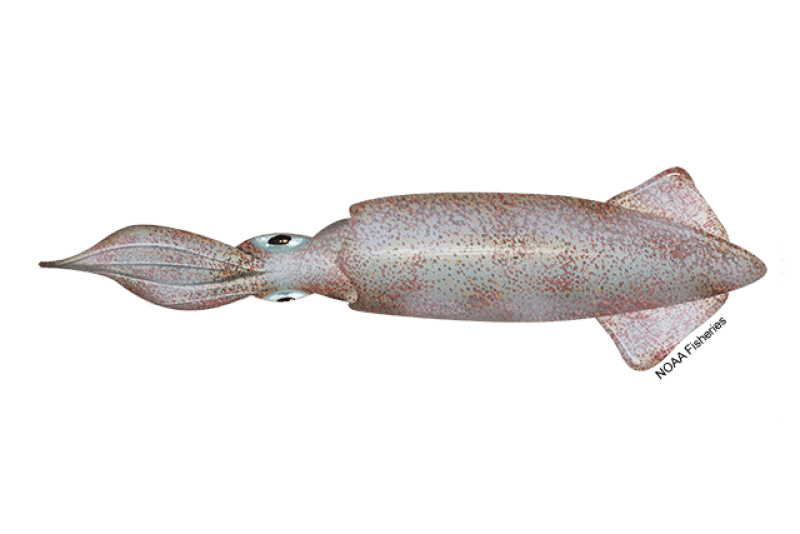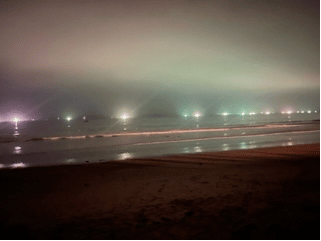Recently, especially last month, western Malibu coastal residents observed large numbers of commercial squid fishing boats right off the coast at night. As many as 60 boats in one relatively small area were reported, shining bright lights, enough to illuminate a football stadium, into the water to attract the squid. Some residents even report “gunshots” going off from the fishing boats, and wonder if the fishermen are shooting at seals and sea lions.
Granted, this is an annual occurrence — a large number of commercial squid fishing boats are right off the coast every year at this time, during “squid season,” with the same kinds of questions and complaints from residents.
This year, on Oct. 16, long-time resident Doug Baron, president of the Trancas Property Owners’ Association, wrote to the Malibu West Homeowner’s Association to outline his concerns about the extent of the commercial squid fishing then taking place off the coast of Broad Beach Road and nearby.
Those concerns included whether the commercial fishing activity was “destroying our pristine marine environmental habitat.” He described the fishermen’s use of “extremely high intensity LED lights” and the sound of gunshots.
“Friday night I documented … two to three gunshots,” Baron wrote.
“They’ll shoot seals and dolphins that interrupt their fishing or inadvertently get caught in their nets as they get disoriented,” he continued. “The main concern is the fallout to the our community and what comes off the boats, whether it be diesel fuel, septic refuse, dumping of tanks, or any other material that exists on a commercial fishing vessel that could potentially end up on Broad Beach, Malibu West Beach Club, Zuma Beach, Westward Beach, or Point Dúme.”
The Malibu Times first contacted the National Oceanic and Atmospheric Administration (NOAA) about these questions, but it turns out that it’s the California Department of Fish & Wildlife (CDFW) that manages squid. Specifically, the Pelagic Fisheries and Ecosystem Program (PFEP) in Monterey.
Four of the most frequently asked questions were sent to our state’s squid experts, and the responses were prepared by Katie O’Grady, an environmental scientist with PFEP:
How can this annual fishing frenzy for squid possibly be sustainable? It’s hard to imagine any squid would be left after a few years of this overfishing. Why are so many licenses granted to so many boats for such a small area?
Katie O’Grady: The California Market Squid fishery is considered sustainable and is highly regulated. Under the Management Plan, there are multiple measures in place to protect the squid resource including a limited entry program, which only allows a specified number of boats to fish statewide, a weekend closure, a seasonal catch limit, lighting restrictions, and area closures. Squid spawn year-round, are short-lived (6-10 months), and are terminal spawners, meaning they naturally die shortly after reproducing. These life history traits are unique from many other fished stocks. The Market Squid Enhanced Status Report is a great resource to learn more about California squid fishery management.
Your questions and comments are timely, because we are initiating a comprehensive review of existing management for this fishery, which will include a stakeholder engagement process and novel assessments over the coming year to inform a more climate-resilient approach to management. You can look to the Fish and Game Commission proceedings to track this management review and provide public input.
Are there any regulations about the lights from the boats that shine so brightly into people’s bedrooms that they could literally read a book? Our town recently passed a “Dark Skies” ordinance regulating nighttime lighting. I know that doesn’t apply to the ocean, but what can be done?
KO: Yes, regulations limit how squid fishing lights are used. Title 14, section 149 (g) includes a maximum wattage of no more than 30,000 watts of lights to attract squid at any time. Section (h) also includes light shielding requirements whereby vessels fishing for squid are required to reduce light scatter by shielding the entire filament of each light used to attract squid and orienting the illumination directly downward. Please visit the link provided for the full description of these regulations. The public onshore, however, will still see light that is either reflected off the water surface or visible as the boats roll and the light shines toward the sides as opposed to straight down.
Is any agency monitoring these boats to make sure they stay out of the Marine Protected Areas which are right next to them?
KO: The California Department of Fish and Wildlife Law Enforcement Division monitors for suspicious or illegal activities, including illegal fishing in Marine Protected Areas. If you witness a poaching or polluting incident, or any fish and wildlife violation you can dial the toll free CALTIP number 1 (888) 334-CALTIP (334-2258) 24/7. You can also visit the CALTIP website (wildlife.ca.gov/Enforcement/CalTIP) for more information. Most squid fishing boats are also required to carry Automatic Identification System transceivers, which report their position on the water and can be monitored by the U.S. Coast Guard.
Is any agency monitoring these boats to stop them from shooting the seals and sea lions that get too close to the boats? People hear gunshots out among the boats, and injured marine mammals sometimes end up at our local wildlife center.
KO: California sea lions and Pacific harbor seals have been federally protected under the Marine Mammal Protection Act since 1972, and thus harassing, capturing, killing, or attempting to do so is prohibited and carries a hefty fine.
Fishermen are allowed to use deterrent devices to prevent seals and sea lions from destroying their catch. These devices are like large firecrackers and may sound like a gunshot. Approved deterrent methods can be found on NOAA’s website, www.westcoast.fisheries.noaa.gov/protected_species/marine_mammals/deterring_qa.html
A marine mammal care center can be contacted for marine mammals in need of assistance. https://marinemammalcare.org/


